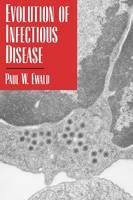
Evolution of Infectious Disease
Seiten
1994
Oxford University Press Inc (Verlag)
978-0-19-506058-4 (ISBN)
Oxford University Press Inc (Verlag)
978-0-19-506058-4 (ISBN)
Aimed at evolutionary biologists, ecologists and epidemiologists, this extended essay presents an evolutionary-biological perspective of human infectious disease.
Ewald is the first author to present a Darwinian perspective on infectious disease, which opens up a whole new approach to health science, one that emphasizes new possibilities for combatting deadly diseases like malaria, tuberculosis, and AIDS.
Taking an evolutionary approach, Ewald views disease-producing bacteria and viruses as parasites and explains the history of disease as a host-parasite relationship, one which can evolve in many different effects on the host population. He explains why the agents of cholera, malaria, and AIDS are so dangerous and why treatment of virtually all diseases would be improved by applications of evolutionary principles.
This merging of evolutionary biology with health sciences offers a new dimension to policy-making in the health sciences by identifying interventions that will force infectious organisms to evolve toward a benign state, to subdue the plagues of the past and help us to avert the plagues of the future.
A wholly readable account of an enthralling and important subject of concern to us all.
Ewald is the first author to present a Darwinian perspective on infectious disease, which opens up a whole new approach to health science, one that emphasizes new possibilities for combatting deadly diseases like malaria, tuberculosis, and AIDS.
Taking an evolutionary approach, Ewald views disease-producing bacteria and viruses as parasites and explains the history of disease as a host-parasite relationship, one which can evolve in many different effects on the host population. He explains why the agents of cholera, malaria, and AIDS are so dangerous and why treatment of virtually all diseases would be improved by applications of evolutionary principles.
This merging of evolutionary biology with health sciences offers a new dimension to policy-making in the health sciences by identifying interventions that will force infectious organisms to evolve toward a benign state, to subdue the plagues of the past and help us to avert the plagues of the future.
A wholly readable account of an enthralling and important subject of concern to us all.
Paul W. Ewald is a professor and Chair of the Biology Department at Amherst College, and holds an adjunct faculty appointment at the University of Massachusetts, Amherst. He has been named the first George E. Burch Fellow of Theoretic Medicine and Affiliated Sciences, a position awarded by the Smithsonian Institution and hosted by the Smithsonian Tropical Institute.
GLOSSARY ; BIBLIOGRAPHY ; INDEX
| Erscheint lt. Verlag | 24.3.1994 |
|---|---|
| Zusatzinfo | frontispiece, line figures |
| Verlagsort | New York |
| Sprache | englisch |
| Maße | 162 x 243 mm |
| Gewicht | 625 g |
| Themenwelt | Medizin / Pharmazie ► Medizinische Fachgebiete ► Mikrobiologie / Infektologie / Reisemedizin |
| Studium ► Querschnittsbereiche ► Epidemiologie / Med. Biometrie | |
| Studium ► Querschnittsbereiche ► Infektiologie / Immunologie | |
| Naturwissenschaften ► Biologie ► Evolution | |
| Naturwissenschaften ► Biologie ► Zoologie | |
| ISBN-10 | 0-19-506058-X / 019506058X |
| ISBN-13 | 978-0-19-506058-4 / 9780195060584 |
| Zustand | Neuware |
| Haben Sie eine Frage zum Produkt? |
Mehr entdecken
aus dem Bereich
aus dem Bereich
Buch | Hardcover (2012)
Westermann Schulbuchverlag
34,95 €
Schulbuch Klassen 7/8 (G9)
Buch | Hardcover (2015)
Klett (Verlag)
30,50 €
Buch | Softcover (2004)
Cornelsen Verlag
25,25 €



